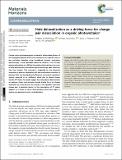Hole delocalization as a driving force for charge pair dissociation in organic photovoltaics
Abstract
Charge carrier photogeneration is studied in photovoltaic blends of the conjugated polymer PTB7 with the electron acceptor PC71BM at low excitation densities using broadband transient absorption spectroscopy. In the optimized blend we observe a rise of hole polaron absorption on a 500 ps time scale which implies an increase of hole delocalization when photo-generated charge pairs dissociate into free charges. This concept is supported by the observed saturation of polaron absorption with electrochemical oxidation of polymer films, and the significant differences in transient absorption spectra observed in an inefficient blend due to bound charge transfer (CT) states. Our results suggest that hole polaron delocalization on polymer chains and entropy provide driving force for charge separation by lowering the free energy of the spatially separated charge pair. A potential barrier to the reformation of CT states appears as a result of carrier delocalization which also helps to reduce non-geminate carrier recombination.
Citation
Matheson , A B , Ruseckas , A , Pearson , S J & Samuel , I D W 2019 , ' Hole delocalization as a driving force for charge pair dissociation in organic photovoltaics ' , Materials Horizons , vol. Advance Article . https://doi.org/10.1039/C8MH01204K
Publication
Materials Horizons
Status
Peer reviewed
ISSN
2051-6347Type
Journal article
Description
This work was supported by the Engineering and Physical Sciences Research Council (grants EP/L017008/1, EP/G03673X/1 and EP/J009016/1) and the European Research Council (grant 321305). I. D. W. S. acknowledges a Royal Society Wolfson Research Merit Award.Collections
Items in the St Andrews Research Repository are protected by copyright, with all rights reserved, unless otherwise indicated.

